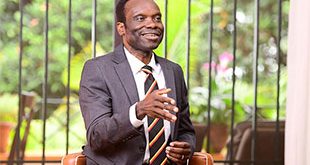
By Agather Atuhaire
Firm grabs positive headlines but critics say bribery allegations remain
While appearing before the Parliamentary Ad hoc Committee on Oil on April 11 to defend themselves against bribery allegations, Tullow Oil Uganda officials said the Production Sharing Agreements (PSAs) they signed with Uganda are the most unfavorable for the company.
Referring to the PSA’s the company signed in Kenya recently, Tullow’s legal counsel Graham Martin said Uganda’s PSA’s are the most adverse agreements they have ever signed. “The terms we have in Kenya are far more attractive and favourable to us than Uganda’s,” Martin said.
Many MPs said it is hard for the committee and the public to believe Tullow’s claims particularly because both the company and the government have been keen on keeping those agreements a top secret. Tullow did not give the committee any copies of the Kenyan PSAs either to compare. So what did Tullow hope to achieve by its public posturing?

Ever since the allegations that Tullow had bribed some top ministers to dubiously get licenses, the company has since struggled to clear its name of all the allegations. They said they were appearing before the Ad hoc Committee to “set the records straight”.
The company with its more than 15 people delegation told the committee that the bribery allegations were false. Martin said they have carried out an investigation in Malta and UK and confirmed that the documents tabled by Western Region Youth MP, Gerald Karuhanga, were forgeries.
They even demanded that Karuhanga retracts his statements and apologises to the company.
“Those allegations are very deep and have put our 25 year history of zero tolerance on corruption in jeopardy,” said Martin.
Ogwal versus Werikhe
Despite Dokolo MP ceclilia Ogwal’s insistence that they give parliament a report of their investigation, Martin refused to comply and insisted only that the allegations were not worth the time or funds for investigation because they were baseless.
Tullow presented to the committee letters written by the company’s two officials to President Yoweri Museveni denying reports from WikiLeaks that they had told then-US ambassador to Uganda Jerry Lanier that the company had given bribes to government officials.
The letters, which parliament has seen before, were from Tim O’Hanlon, the company’s vice president for African business, and Andy Demetreu, another employee of the company.
They also presented a letter from the Managing Director of Bank of New York Mellon, Ivan Royle, which Karuhanga said was involved with the transfer of the money from the company to the government officials.
At the meeting, MP Ogwal made it clear that their “evidence did not prove anything”. Michael Werikhe, the Bungokho south MP who is the committee chairman, however, said he thought Ogwal was being harsh on Tullow’s officials. When he tried to shield them from further questions, a tough talking Ogwal snapped at him
“Why don’t you let them answer,” the former UPC’s iron lady who has since joined Forum for Democratic Change asked the chairman, “On whose side are you?”
That did not stop headlines like “Two police confirm documents in Tullow Oil bribery case were forged” in the Irish times. They based on the parliamentary committee meeting and said “Tullow produced statements from both the Maltese and London Metropolitan police forces saying that the allegations were without foundation”.
“A sworn letter from Insp Maurice Curni of Malta confirmed that Tullow has no accounts with the Bank of Valletta. A letter from Det Sgt George Simpson of the London Metropolitan police confirmed that EFG Bank in Britain had no accounts relevant to the investigation,” the paper said.
Tullow is listed on the London Stock Exchange (LSE) and on the day of these stories its shares rose 1.59% on the good news.
No sympathy
In Uganda, however, on its claims that the Ugandan PSAs were unfair, Ndorwa East MP Wilfred Niwagaba says Tullow “is pretending to be the victim and to make Ugandans believe that everything is ok when all things are going wrong”.
“If they were honest,” Niwagaba said, “they would have laid both agreements on the table for proper comparison.”
Global Rights Alert Executive Director Winnie Ngabirwe says Tullow is seeking sympathy because they know things are getting stricter. “Tullow is just being shallow,” said Ngabirwe, “I have seen Ghana’s PSAs and the terms of Ghana are not better than those of Uganda in anyway.”
Ngabirwe said the only difference is that Ghana had a legal framework for the oil sector even before the signing of the agreements so there were no alterations.
“Tullow is just trying to draw the legislators’ sympathy by complaining so that they put lenient conditions for them if the agreements are reviewed,” she said. But Ngabirwe said interests of Ugandans should be put first and “no one should support Tullow to rob Ugandans”.
According to Ngabirwe, Tullow wanted the sector to remain the way it has been so it can continue benefiting them at the expense of Ugandans. She adds that it is the reason they have started to raise a lot of issues and even gone to court over a tax they know they should pay.
Tullow has dragged Uganda Revenue Authority to court contesting a Capital Gains Tax that the latter assessed on it after the former’s farm down to CNOOC and Total. While URA says Tullow must pay $427m, Tullow is claiming an exemption on one of the three blocks.
Dickens Kamugisha of African Institute for Energy Governance said there is neither need nor mechanism of comparison between Uganda’s agreements and other agreements. He says what is happening in the Ugandan oil sector is enough to show that there are loopholes in those agreements.
“I am not in position to say whether Uganda’s agreements are better than the other’s especially the ones for Ghana that I have seen,” said Kamugisha, “it is not only because I have never compared them but also because it is complicated to compare the two when the circumstances and other structures in the two countries are totally different.”
But Kamugisha said there are various yardsticks that show that Uganda’s agreements are not better than any other agreements and are therefore not harsh to the company like it claims.
“Ghana’s oil sector is far ahead of Uganda’s when oil was discovered here first,” he said adding that the reasons Uganda has not even started producing when Ghana has already produced barrels and barrels is because Uganda’s agreements did not include all that needed to be included.
He wondered why Ghana has not had all the issues that have engulfed the Ugandan sector if the terms here are favorable to the government. “If these terms were better in our case, we would not have all the issues we have now with companies dragging the government to courts,” Kamugisha added.
He said better agreements would have all those eventualities catered for, for instance the tax issues and where arbitration should take place in case of any disputes to save a sovereign government from being dragged to international courts.
According to Kamugisha, the company is just being dishonest because if the terms here were harsh to them, they would have supported parliament’s resolution to review the agreements.
“Tullow defied parliament and went on to sign more agreements when a resolution was passed that signing of new agreements be halted and the old ones reviewed,” he said, “if they had any concerns, they would have agreed to that so that their issues are addressed as well.
“Why are they now being hypocritical before a parliament they have never respected?”
What Tullow intends to achieve?
The reasons for Tullow’s claims before the committee where they had gone to defend themselves against bribery allegations and not to talk about the agreements remain unclear.
The agreements have already been signed by the company and there is no hope of going back. So why was Tullow claiming the terms they have here are harsh to them?
Analysts say Tullow must have realised that the oil sector is slipping away from the hands of the executive that they have always dealt with in the past. They argue that the company has now smartly realised that they will not be running to President Yoweri Museveni to solve their problems but to institutions like committees of parliament and others that are to be put in place under new laws.
Kamugisha said Tullow has always dealt with only the executive and they know that things might not remain in their favour with proper regulation in place.
MP Niwagaba agreed. He said Tullow is shedding crocodile tears because they know they have exploited the irregularities caused by the executive in the sector.
Ngabirwe said Tullow is fearful of the Bills before parliament and that all their flaws might soon be e exposed. She said they want to play victims before parliament so that they think there is no need to review the agreements. According to Ngabirwe, Tullow wants to keep using the weaknesses of the PSA’s and the unregulated sector to their advantage.
More worries
Tullow seems to be worried about a lot of things. Its President, Elly Karuhanga, said the petroleum sector Bills currently before parliament, create many power centres which might frustrate oil companies and derail the whole process.
“It will be antagonising for oil companies to go through all those centres of power if these bills are passed in their current form,” said Karuhanga.
He said it is important that parliament allows suggestions and recommendations from all stakeholders concerning the Bills. Several Bills before parliament propose setting up a petroleum authority, and national oil company. They redefine roles in the oil sector for old entities like the National Environment Management Authority, Uganda Wildlife Authority and all the other structures that will be responsible for oil and the related activities.
But CSO agents like Ngabirwe say Karuhanga should not be worried unless his fear is that oil companies will not be able to compromise all the involved structures and would rather deal with only the executive.
“Why is he worried about those structures,” she asked, “there is nothing that will derail the process when things are being done in the proper way.”
She said the only thing that can derail the process is if the institutions are not functioning or lack finances or manpower. But the process, Ngabirwe said, cannot be derailed by the right system.
It appears Tullow still has a long way to go to clear all the suspicions and restore its “25 year old good image”. Although parliament and the public did not agree with Speaker Rebecca Kadaga’s choice of the Adhoc Committee of seven, Ogwal seems set to give all those involved a rough time.
 The Independent Uganda: You get the Truth we Pay the Price
The Independent Uganda: You get the Truth we Pay the Price



